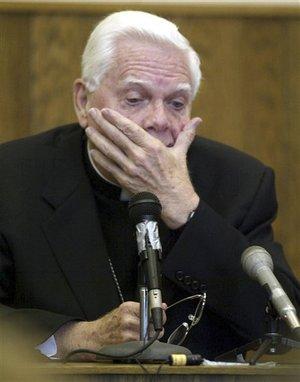By Jay Lindsay
Kansas City Star
November 9, 2011
http://www.kansascity.com/2011/11/09/3256764/in-penn-state-some-see-boston.html
 |
| George Martell, Pool, File |
Nearly a decade and hundreds of miles separate Penn State from the clergy sex abuse scandal that erupted in Boston's Roman Catholic archdiocese then spread nationwide, but those who lived through the church crisis see painful parallels.
At Penn State, school administrators, including a beloved coach known for his integrity, didn't notify prosecutors when they learned years ago that former assistant football coach Jerry Sandusky had been accused of molesting children. In the Archdiocese of Boston, the case of one predator priest led to revelations that for decades church leaders had moved guilty clergy among parish assignments without alerting parents or police.
Both cases have had consequences for administrators.
Boston's Cardinal Bernard Law wound up leaving his post and, on Wednesday, Penn State President Graham Spanier and coach Joe Paterno were fired.
Failing to act thoroughly on abuse allegations has happened in organizations ranging from the Boy Scouts to elementary and high schools - even when the molestation occurs within families. Still, Boston-area Catholics can't help but see some similarities between what they went through and what the Penn State community is suffering now. How could such respected leaders fail to take swift action to protect children?
"The sort of instinct to protect the institution is very similar. And of course, in both cases, it backfires horribly. If your idea was to avoid a scandal, you sure failed," said Phil Lawler, who wrote "The Faithful Departed: The Collapse of Boston's Catholic Culture."
The scope of the crimes alleged to have taken place at Penn State doesn't nearly match those in Boston, where dozens of priests were accused of abusing hundreds of victims over six decades. At Penn State, Sandusky was indicted on charges he abused eight boys over the course of 15 years.
Still, a couple of Penn State administrators face accusations that echo what was alleged in Boston.
Two Penn State officials, Senior Vice President Gary Schultz and Athletic Director Tim Curley, turned themselves in after being indicted on perjury charges and accused of failing to alert police about abuse complaints. Their lawyers say they're innocent and will seek to have the charges dismissed. Sandusky's attorney also has said his client is innocent.
The indictment paints a picture of administrators who had ample warning about Sandusky but failed to act.
It charges that in 1998, an 11-year-old boy's mother complained to university police after learning that her son had showered with Sandusky, who promised not to shower with any child again and retired from Penn State the next year. The district attorney at the time did not prosecute the case.
The most explosive charge in the indictment says that a graduate assistant saw Sandusky assaulting a 10-year-old boy in the shower in 2002 and told Paterno about it. The coach said he wasn't told specifically what the assistant saw but reported what he heard to school officials.
Sandusky was prohibited from holding youth sports camps on Penn State's main campus in 2002. But he continued to conduct them over the next several years at the university's Behrend satellite campus while also maintaining an office across from the Penn State football team's building until the present day.
Boston attorney Carmen Durso, who's represented numerous clergy sex abuse victims, said the Boston and Penn State cases likely will share a lack of proper accountability for the people who allowed abuse suspects to work with children years later.
"If you're a powerful person in any regard, the rules are different for you," he said. "That's why Cardinal Law just had his (80th birthday) party in Rome, and that's why Joe Paterno is still a hero to people even though he let this go on."
A Penn State spokeswoman did not return a call seeking comment.
Child sex abuse expert Kenneth Lanning, who worked in the FBI for 30 years, said the abuse suspects in Boston and at Penn State share similar profiles as "acquaintance molesters," who have access to children, do good things for them and often are seen so far above reproach that people don't believe even obvious signs that something is wrong.
He said institutions such as Penn State and the Boston archdiocese also have similar profiles, as successful and respected organizations, with strong motivation to preserve their reputations. That can lead to bad decisions to avoid negative publicity, even if there's no malicious intent, he said.
"Any youth-serving organization can have these problems," he said. "But I think when you have a youth-serving organization that has a certain aura about it, or status about it, then I think there's at least a strong potential that that can influence their decision-making process and how they handle things."
Any original material on these pages is copyright © BishopAccountability.org 2004. Reproduce freely with attribution.